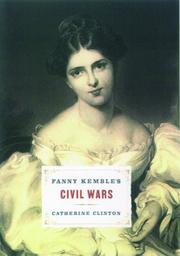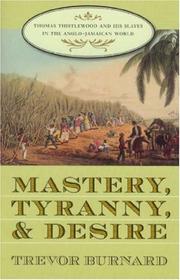| Listing 1 - 10 of 94 | << page >> |
Sort by
|

ISBN: 0195148150 Year: 2001 Publisher: New York (N.Y.): Oxford university press
Abstract | Keywords | Export | Availability | Bookmark
 Loading...
Loading...Choose an application
- Reference Manager
- EndNote
- RefWorks (Direct export to RefWorks)
Book
Abstract | Keywords | Export | Availability | Bookmark
 Loading...
Loading...Choose an application
- Reference Manager
- EndNote
- RefWorks (Direct export to RefWorks)
Sri Lanka --- Plantation owners --- Elephants --- American fiction
Book
ISBN: 0817393358 0817320792 9780817393359 9780817320799 Year: 2021 Publisher: Tuscaloosa : Baltimore, Md. : The University of Alabama Press, Project MUSE,
Abstract | Keywords | Export | Availability | Bookmark
 Loading...
Loading...Choose an application
- Reference Manager
- EndNote
- RefWorks (Direct export to RefWorks)
"In the early nineteenth century, while abolitionism was rising and the slave trade was declining in the Atlantic world, Spain used this opportunity to massively expand plantation slavery in Cuba. Between 1501 and 1866, more than 778,000 Africans were torn from their homelands and brought to work for the Cuban slaveholding class. An understudied aspect of Cuban slaveholding society is the role of the white Cuban slave mistress (amas). The Power of Their Will: Slaveholding Women in Nineteenth-Century Cuba illuminates the interaction of female slaveholders and the enslaved during this time. Teresa Prados-Torreira shows, despite the lack of political power in a highly patriarchal society, Cuban women as property owners were instrumental in supporting the long duration of slavery, whether by enforcing the disciplining of the enslaved in the domestic sphere or helping to create the illusion of slavery as a humane institution. Thousands of Creole slaveholding women relied on slaves to lead a comfortable life. Even the subsistence of many poor women depended on the income derived from the hiring out of their enslaved. In this accessible cultural history, culled from government documents, fiction, newspaper articles, traveler's accounts, women's wills, and archival research, Prados-Torreira coalesces a valuable narrative out of the often paradoxical and conflicting stories of the human bonds between the female owner and the enslaved. Narrative chapters, enlivened by vignettes, describe the daily life of slave mistresses in the main cities of Havana and Santiago and other towns, workings of sugar mills and coffee plantations, how slaveholding women coping with slave rebellions and wartime during the Ten Years' War, and how personal relationships could occasionally affect the balance of power"--
Women --- Women plantation owners --- Slavery --- Slaveholders --- Social conditions --- History --- Cuba.
Book
Year: 1955 Publisher: Bruxelles C. Dessart
Abstract | Keywords | Export | Availability | Bookmark
 Loading...
Loading...Choose an application
- Reference Manager
- EndNote
- RefWorks (Direct export to RefWorks)
Congo belge (1908-1960) --- Italians --- Personal narratives --- Plantation owners
Book
ISBN: 1421440962 9781421440965 9781421440958 1421440954 Year: 2021 Publisher: Baltimore : Johns Hopkins University Press,
Abstract | Keywords | Export | Availability | Bookmark
 Loading...
Loading...Choose an application
- Reference Manager
- EndNote
- RefWorks (Direct export to RefWorks)
"The author presents a case study of a single plantation, Rose Hill, on the Eastern Shore of Maryland, the home of Thomas Marsh Forman (1758-1845) and his wife, Martha Ogle Forman (1788-1864). The author uses Martha Forman's diary, updated daily from her marriage day in 1814 until after the death of her husband, as her primary source of information about the details of life at Rose Hill"--
Slavery --- Enslaved persons --- Plantation owners' spouses --- Plantation owners --- Plantation life --- History. --- Social conditions --- History --- Forman, Thomas Marsh, --- Forman, Martha Ogle, --- Cecil County (Md.) --- Rose Hill Plantation (Md.)
Book
ISBN: 9780674988590 0674988590 9780674988576 0674988574 9780674972094 0674972090 Year: 2018 Publisher: Cambridge, Massachusetts : Harvard University Press,
Abstract | Keywords | Export | Availability | Bookmark
 Loading...
Loading...Choose an application
- Reference Manager
- EndNote
- RefWorks (Direct export to RefWorks)
Caitlin Rosenthal explores quantitative management practices on West Indian and Southern plantations, showing how planter-capitalists built sophisticated organizations and used complex accounting tools. By demonstrating that business innovation can be a byproduct of bondage Rosenthal further erodes the false boundary between capitalism and slavery.
Slavery --- Human capital --- Plantations --- Plantation owners --- Economic aspects --- History --- History. --- Accounting --- Human capital. --- Plantation owners. --- Accounting. --- Economic aspects. --- 1700-1899. --- United States. --- West Indies
Book
Year: 2015 Publisher: [s.l.] : Editora da Universidade Estadual da Paraíba,
Abstract | Keywords | Export | Availability | Bookmark
 Loading...
Loading...Choose an application
- Reference Manager
- EndNote
- RefWorks (Direct export to RefWorks)
Gilberto Freyre é o principal formulador do ideário regionalista nordestino. Nos textos de interpretação sociológica que produziu, desde o início da década de 1920, já aparecem as matrizes temáticas que estarão presentes nos romances de José Lins do Rego, escritos na década seguinte, consubstanciando, assim, um rico desdobramento estético daquele regionalismo e, ao mesmo tempo, uma interseção entre sociologia e literatura que abordamos a partir de ensaios, romances e cartas destes dois autores, onde sociologia e romance, conceitos e afetos e ideologias se fundem na compreensão, ora empática, ora nostálgica, ora dramática, de uma sociabilidade que remonta às raízes imemoriais de nossa sociedade.
Plantation owners --- Freyre, Gilberto, --- Rêgo, José Lins do, --- Criticism and interpretation. --- HISTORY

ISBN: 1469605023 0807898740 9780807898741 9781469605029 0807855251 9780807855256 0807828564 9780807828564 0807855251 9780807855256 Year: 2004 Publisher: Chapel Hill : University of North Carolina Press,
Abstract | Keywords | Export | Availability | Bookmark
 Loading...
Loading...Choose an application
- Reference Manager
- EndNote
- RefWorks (Direct export to RefWorks)
Mastery, Tyranny, and Desire: Thomas Thistlewood and His Slaves in the Anglo-Jamaican World
Slaveholders --- Plantation owners --- Plantation life --- Enslaved persons --- History --- Social conditions --- Thistlewood, Thomas, --- Jamaica --- Race relations. --- Slaves

ISBN: 0807828564 0807855251 9780807855256 Year: 2004 Publisher: Chapel Hill University of North Carolina press
Abstract | Keywords | Export | Availability | Bookmark
 Loading...
Loading...Choose an application
- Reference Manager
- EndNote
- RefWorks (Direct export to RefWorks)
Plantation life --- Plantation owners --- Slaveholders --- Slaves --- History --- Social conditions --- Thistlewood, Thomas, --- Jamaica --- Race relations.
Book
ISBN: 0674988574 0674988590 Year: 2018 Publisher: Cambridge, Massachusetts : Harvard University Press,
Abstract | Keywords | Export | Availability | Bookmark
 Loading...
Loading...Choose an application
- Reference Manager
- EndNote
- RefWorks (Direct export to RefWorks)
Caitlin Rosenthal explores quantitative management practices on West Indian and Southern plantations, showing how planter-capitalists built sophisticated organizations and used complex accounting tools. By demonstrating that business innovation can be a byproduct of bondage Rosenthal further erodes the false boundary between capitalism and slavery.
Slavery --- Human capital --- Plantations --- Plantation owners --- Economic aspects --- History --- History. --- Accounting
| Listing 1 - 10 of 94 | << page >> |
Sort by
|

 Search
Search Feedback
Feedback About UniCat
About UniCat  Help
Help News
News